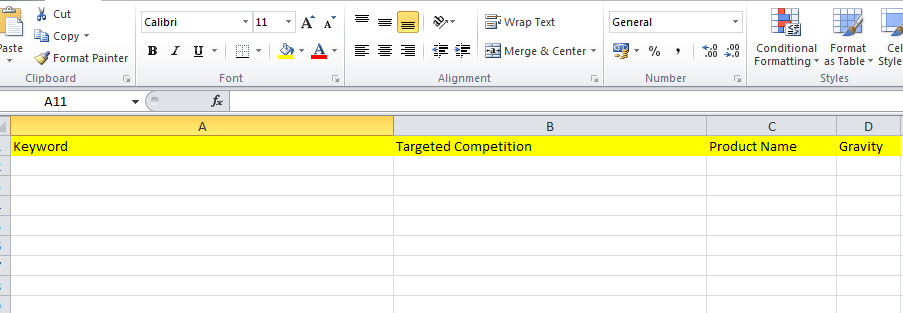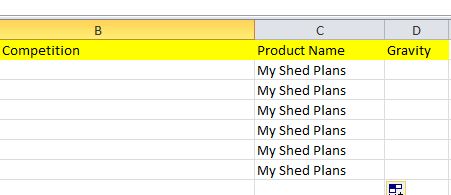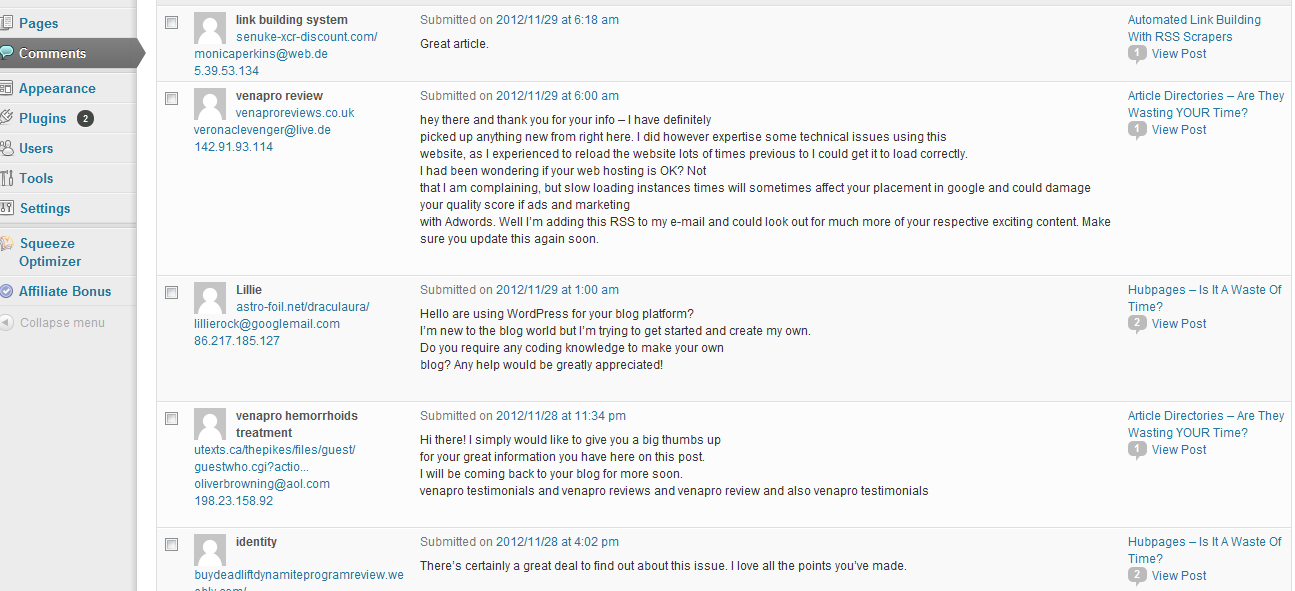How To Do Keyword Research PROPERLY
In this article you’re going to learn how to do keyword research properly, in order to find highly profitable buyer keywords. What you’re going to read is the first part of my Keyword Research Redux guide (you can buy the full thing here for just $7 – do it, you won’t regret it). I spent hours putting together this guide, so I really hope you like it!
How To Do Keyword Research LIKE A BOSS
This isn’t meant to be a long-winded and boring report. In fact, I’m going to make this as short as possible, and use as many pictures and diagrams as I can find to help explain the extremely important concepts that you’re about to learn.
What I’m going to teach you in Keyword Research Revisited might actually piss you off a little bit. Why? Because it represents a dramatic shift away from everything you thought you knew about keywords, and everything the “gurus” have probably taught you.
However, I’m sick to death of seeing hard working people like you foiled at every turn of the keyword research process. I’m also fed up of seeing forum threads where people follow the ‘status quo’ of keyword research, spending countless hours and dollars on trying to achieve that magical first page ranking for a totally “killer” keyword phrase, only to find that the traffic is as cold as ice and doesn’t convert anyway.
So basically, Keyword Research Revisited is a cut-throat guide to the harsh realities of keyword research that actually drives profitable and reliable traffic. This isn’t a guide to finding keywords that are going to get you tens of thousands of visitors. Instead, this is an honest guide for finding keywords that are used by people looking to buy (or at the very least join your mailing list)
The Harsh Truth About Affiliate Marketing
Traditional affiliate marketing (or general Internet marketing) logic runs thus:
Find a “profitable niche” à Research a decent-sized list of keywords that people are searching (until you’ve got the cash monies to do PPC) à Create a website à Collect leads à Try to sell products to these leads or visitors
Now this is all very straightforward.
However, there is some important “lateral thinking” missing here. I’m the first to admit that keywords are important (as I alluded to above with the train track allegory) but the problem is 90% of affiliates, and almost 100% of newbies, still fail to recognize the biggest hurdle to success with keywords.
I’m talking about buyer intent.
You can see it all the time on Internet marketing forums; someone posts up about how they’ve found a “killer” keyword with 2-3k searches per month, long-tail, and bugger all competition. Three months later, they’re back complaining that keyword doesn’t make them any CASH.
So what’s the rub?
Let’s look at some made-up examples of the kinds of keywords I’m talking about. You know, the ones people spend $197 on software just to find (some people never learn)
- “How to get rid of belly fat”
- “Ways to train your dog to jump through fire rings”
- “What is the easiest way to do a runner from the cops?”
And so on…
Now I don’t dispute for one second that these kinds of keywords can have massive search interest, nor are they useless (I will cover their extreme importance in the advanced part of this book). However, for the purpose of making money “off the bat” and cold converting traffic, they are rubbish.
Here’s why:
These types of keywords are designed to elicit information, in the vast majority of cases. 95% of the people searching up “how to get rid of belly fat” aren’t looking to buy an eBook. Nor are those with a penchant for fire-jumping dogs, or those with a felon streak looking for a quick getaway. Where most affiliates stumble is that they fail to realize these keywords are “informational keywords”. There is a really low degree of buyer intent here. Hell, even getting such cold traffic to sign up to your list could be a challenge, unless you’ve got a mad giveaway hook and loads of steeze with which to sell it.
Think about it – when you search “how to xxx” on Google, if you hit a site that’s crammed with affiliate links for quite often average eBooks, or even physical products, chances are you’ll probably bounce. Myself, I’ve made it a point to only search for information on academic websites (protip, use “site:.edu + your search term” to deliver academic quality results) high quality blogs and discussion boards/forums. Everything else I just discard basically, as I know that if I were to search “weight loss exercises”, for example, anything that doesn’t fit the criteria I mentioned above will likely be trying to bombard me with affiliate links, sales pitches, and opt-in forms.
Now I know not every web user is as discerning as I am – and these are the ones we are trying to target! There is also nothing wrong whatsoever with trying to monetize your traffic (that is, after all, what both mine and your business happens to be). However, you have to fact the truth that you will struggle to convert “cold” traffic; these are the people who are going online purely for information. They have little/no intention of actually buying anything, and want whatever they are searching for free.
Understanding Buyer Intent
If you’ve ever gone through Mark Ling’s AffiloBlueprint course, then you’ll be familiar with the term “buyer intent”. Basically, this is a way of determining whether a keyword implies that the person searching it is either:
a) Looking for FREE information (browser)
b) Looking to buy something – either physical or digital (buyer)
Buyer intent is super important, but it is something that a lot of people seem to misunderstand. If you can get buyer intent right, then you are already light years ahead of your competition when it comes to finding profitable keywords and making real money online.
You see the problem is most keyword research methods, marketing “blueprints”, hyped-up WSOs, and other info products targeted to affiliate and Internet marketers don’t teach the concept of buyer intent very well at all.
However, without mastering buyer intent you’ll never progress beyond hoping that your traffic is going to convert to sales.
So how do you master buyer intent?
Well it’s actually quite simple. Basically, you need to get inside the head of the person searching for your keyword(s) and work out whether they are looking for information, or looking to buy. The easiest way to do this is to look first for certain “trigger terms”.
Browsing/Free Information Trigger Terms:
- Free (“free dog training guide”)
- How to (“how to play guitar”)
- Ways to (“ways to lose weight”)
- [keyword] guide (“gold investment guide”)
I know I’m going to cop a lot of flak for some of the browsing/free information trigger terms I’ve shown above, especially the “how to” keywords as they are particular favourites of affiliates. However, in my experience and speaking with the utmost degree of honesty here, most of the types of keywords other people are teaching you look for just don’t work very well.
The only exceptions are if you:
1) Are an extremely talented pre-seller who is basically able to tell someone looking for free information that they are really looking to buy something instead. In that case, what are you doing reading this guide? You already know how to make loads of money – if you can presell then it’s basically a licence to print money out of thin air – so go do it!
2) You are able to target “how to” and other informational keywords with massive traffic. I’m not talking information or browser keywords with hundreds or thousands of exact monthly searches. Instead, I’m talking about ranking number one in Google for terms with literally tens of thousands, preferably hundreds of thousands of searches per month. If you can hammer the first page for these kinds of keywords, then by all means do. However, most of us don’t have the time or resources to try and rank first page for super competitive keywords.
The biggest problem with targeting browsing/free information keywords is that the traffic is difficult to convert into sales. Someone who is looking for free info, and who has very low buyer intent, is going to take a whole lot more convincing to actually go out there and spend money. This is especially the case when it comes to information products (lie 99% of all the stuff on Clickbank) because most people aren’t completely stupid and will ask themselves why they need to PAY for a book on weight loss, for example, when there are loads of websites offering top-notch information.
Now do you see the importance of buyer intent?
Conversely, there are keywords with massive buyer intent, where the people searching are sitting behind their monitor with their credit cards out and ready to strike. These are the kind of people you want to be hunting down, because once you start driving most of your traffic from buyer keywords you will notice massively improved conversion rates, lower refunds, and have less hassles trying to actually get people to buy.
Unless you are into Internet/affiliate marketing for charity, you want to be targeting keywords with hungry buyers. This is especially the case if you want to build up profitable niche websites, as opposed to building an authority site that receives so much traffic you never need to worry about buyer intent.
In my experience, most affiliates and Internet marketers are pretty fond of making niche sites focused around a group of keywords (maybe 20-30) that are all info keywords with low buyer intent. This is pretty much the basis of 99% of training courses out there that focus on teaching you how to make money from building websites.
However, the methodology of keyword research is totally flawed for most of these courses, because at the end of the day it’s far more important to target people who are buying, rather than those who are merely seeking information. But when you’re putting together a blockbuster training course, it just doesn’t look very good to show people how to research highly-targeted keywords with high buyer intent, because often the search volumes for these are quite low. Instead, most courses focus on showing you how to target high search volume “info” keywords, because there is a lot more data to go on.
But it’s all lies, damned lies, and statistics!
You want to target keywords with “buyer trigger terms”, such as:
- Buy [product name]
- [Product name] discount
- [Author name] [product name] review
- What is the best [product type]?
- How much is [product name]?
- [Product name] scam (WARNING – Some affiliate programs or merchants block you if you use this kind of keyword. That’s totally their prerogative, so don’t complain and check the terms of service first!)
- [Product type] comparison
Seriously, these are about the only keywords types you need to target in order to be successful online as an affiliate marketer, info product seller, or someone who promotes physical products through a program like Amazon Associates.
How do I know people are searching these keywords? It’s pretty simple really! Firstly, if there are sales being made of the product, then you can bet your bottom dollar that people are looking for reviews of the product, wanting to know if it’s a scam etc. This is just common knowledge, and I challenge anybody to prove me otherwise.
Secondly, Google Suggest directly demonstrates that REAL people are searching for these high buyer intent keywords. Want an example?
The higher up that list the keyword is, the more people are searching it. We can conclude, therefore, that more people are searching for an honest review of My Shed Plans than there are interested in a free download!
Forget all the heavy volume keyword stuff, where you spend years trying to rank for that golden keyword phrase getting tens of thousands of searches per month (only to find that the traffic doesn’t convert, because as you should know by now it has zero buyer intent). Instead, you should be building pages and sites based around keywords with massive buyer intent.
Keyword Quiz
If you’re still confused by the difference between hot/cold keywords – and you want a real taste for what’s coming up in Keyword Zen – then try this little quiz. What I’ve done here is put together a list of 10 different keywords, and you have to tell me whether the keyword is a) hot or b) cold (hot meaning high buyer intent, cold meaning the opposite)
- “Ways to lose belly fat”
- “Best belly fat exercises”
- “Equipment to help lose belly fat”
- “What is the best weight training ebook?”
- “Joe Blogg’s ‘Weight Training Secrets’ review”
- “Home gym equipment comparison”
- “How can I improve my vertical jump?”
- “Secrets of jumping higher”
- “Shoes that make you jump higher”
- “Jump training coaching”
Answers:
1) B
2) B
3) A
4) A
5) A
6) A
7) B
8) B
9) A
10) A
If you got more than 6/10 right, then congratulations, you’re now ready to move on to learning how to do the keyword research.
If you didn’t do so well, then go back and re-read this section so you understand what I’m talking about!
Hot Traffic With Buyer Intent – Research
Were you worried that I would leave you in the lurch, and not actually tell you about finding keywords with high buyer intent and that elusive “hot traffic”. Well, there’s absolutely no need to worry as I always try my best to deliver.
Let’s imagine for a second there is the following group of keywords:
- “Buy weight loss equipment”
- “Buy weight loss dvds”
- “Best men’s chronograph watch”
- “Discounts on chronograph watches”
- “Cheap guitar lessons”
Okay, this is a pretty much unrelated group of keywords apart from one little fact – they all have really high levels of buyer intent. Basically, all of these keywords inherently imply that the person searching for them is ready and willing to spend some money!
The “buy xxx” (and I don’t mean porn here!) keywords are the best example of buyer intent that there are to find. It’s so easy pretty obvious to see why people searching for such phrases are, in fact, looking to buy. I shouldn’t need to explain this to you.
However, slightly more confusing (but nonetheless still very profitable and hot) are the “best” “discounts” and “cheap”-type keywords. These all have high buyer intent, because:
- The “best”-type keywords imply that the user is searching for the best product/book/eBook/guide, and are willing to buy. It’s not really much different to walking into an electronics store and saying to the salesman, “what is the best TV you have for sale?” As an affiliate marketer, this kind of web user is ripe for the picking. They want to buy something, but just need a gentle nudge in your direction (towards your affiliate link!)
- Discount/cheap keywords clearly imply that the user wants to buy something. However, they are looking for the best possible price – and rightly so! It’s your job to ‘be the middleman’ here and hook them up with a great deal, with you taking your deserved cut.
Doing Buyer Keyword Research
If you’ve got an eagle eye and are great at paying attention, then you’ll remember before that I said buyer keyword research is actually really easy. Basically, as long as you now understand the supreme importance of finding keywords with high buyer intent (using those template trigger terms I gave you) then you should be able to research enough keywords for an entire site in just a few minutes.
I’m going to assume that you’re an affiliate marketer here who is trying to promote products on Clickbank (this is a pretty fair assumption to make). So what you’re about to learn is how to do accurate buyer-friendly keyword research. You can then find a whole bunch of these keywords, throw in a few “info” keywords (to make your site more Google friendly) and then you’re away. This method also works for promoting Amazon products as well.
Firstly, you need to pick a niche. In this case, I’m going to pick shed plans & woodworking. With times tough in the economy, building chicken coops, garden sheds, food planters etc is all very popular. There is huge demand for this type of product, which I found by going to the “Home and Garden” category of Clickbank:
As we can see, Tedswoodworking.com has a gravity of over 107, and My Shed Plans has a gravity score of 57.29. These are both very respectable scores, which indicate that around 107 and 57 affiliates respectively have made at least one sale of each product in the past couple of weeks (that’s a very rough explanation of how gravity works)
Now let’s say I wanted to build a site all about this type of DIY woodworking and construction. It would be fair to assume there are plenty of products like this on Clickbank (and there are!). Furthermore, once I’m done with the keyword research on Clickbank I could cross-promote on Amazon selling things like hammers, power tools, safety equipment, and more. This could all be done without ever needing to target a single poorly-converting “how to” keyword. Basically, the keyword research process involves targeting keywords based off product names.
So, let’s look at the keyword research!
I’m going to start with the product My Shed Plans. As a rule, you want to look for products on Clickbank that have a gravity score greater than 10, but lower than 100. This rules out Tedswoodworking.com for the time being – although once you’ve got a website established, have built some links, and are attaining good Google rankings you can definitely consider coming back and promoting products with higher competition. However, for the time being you want to be researching keywords that you have a good chance of ranking for.
So here’s what you need to do:
1. Open up Microsoft Excel (or a similar alternative) and set up your spreadsheet as follows:
2. Grab the product name, in this case “My Shed Plans” and add it to column C. Drag it down so there are about 9-10 entries:
3. Enter 57.29 for the gravity score, and then drag that down to the same.
4. Take the product name, and plug it into each of the following keyword templates:
- My Shed Plans review
- My Shed Plans scam
- Buy My Shed Plans
- My Shed Plans discount
- Get My Shed Plans
- My Shed Plans comparison
- Where can I buy My Shed Plans
- Ryan Henderson My Shed Plans review
- Ryan Henderson review:
5. It’s time to check the “Targeted Competition”. Those of you who remember back to the good old days of bum marketing by Travis Sago will remember that “Targeted Competition” was a very effective way of determining which keywords had great ranking potential, based on the EXACT number of websites and web pages that are using that EXACT keyword. Checking targeted competition is easy.
6. Firstly, head over to Google.com
7. Type in your keyword, and enclose it in quotation/speech marks (“”):
We can see there are 342,000 exact results. This is quite a lot of competition – as a general rule, anything over about 100,000 is too much. However, note that figure down in the “Targeted Competition” field anyway (I’ll explain why in a moment)
8. Repeat this process for all the remaining keywords
9. Sort the keywords on the basis of targeted competition from smallest to largest:
10. Check the results:
So what we can see here is that there are 4 keywords with less than 100,000 targeted competition. If I were to build a site targeted around My Shed Plans, I would start by making my first 4 articles based on those keywords.
Now the other keywords are still worth keeping, because it’s not impossible to rank for them! Quite often when you target product name keywords with high buyer intent, you’ll find a bit of targeted competition. However, this competition often comes in the form of really crappy affiliate sites – but you’re going to build something awesome, I hope 😀
Here’s an example:
I’ve searched up Ryan Henderson My Shed Plans review, and take a look at this result:
The first site, www.ryanhendersonmyshedplansreview.com is pretty damn amateurish, if you ask me.
It’s a single page of absolute nonsense, and as far as I can tell it doesn’t have any super powerful backlinks pointing to it. Now if you were to build a decent site with 30+ pages of great content, rich multimedia in the form of images and embedded YouTube videos, regular updates and more, then you’ll soon find yourself ranking in front of this type of nonsense.
So basically, what I’m trying to say is that although there can appear to be quite a lot of competition for these high buyer intent keywords, you’re generally not coming up against a very high calibre of competition. Compare this to “info” keywords, where you’ll often find yourself trying to rank against niche authority sites, Wikipedia, About.com etc. The only real exception is if you’re promoting products on Amazon.com, where you could find yourself challenging Amazon itself for search rankings.
Target those keywords systematically – from the easiest to the most difficult, and then rinse and repeat for other products. After all, the whole crux of this method is to target buyer keywords. Although you won’t drive anywhere near as much traffic, you’re much more likely to convert that traffic to sales. And at the end of the day, you’re in this for the money – so if you can put in less effort to make more income, why the bloody hell wouldn’t you?
Like What You Read? Now Get The Rest (& The Best!)
Thanks for reading the first part of my guide – you now know how to do keyword research properly!
You’ve still got a long way to go though, so it’s time to hunker down and learn the advanced techniques of buyer keyword research and monetisation with Keyword Research Redux.
Inside you will discover:
* Exactly how to research profitable keywords for massively increased profits
* Why you’re wasting your time targeting “info keywords” (and how to break out of that vicious cycle)
* The secrets of keyword research that the so-called gurus don’t want you to know
* Underground advanced strategies for skyrocketing to the top of Google rankings for your buyer keywords
* The EXACT system for hugely profitable paydays with Clickbank + Buyer Keywords + a very special Web 2.0 site – this is literally the easiest method you will EVER follow and people who have used it have made money within 24 hours. You could even outsource it for extreme autopilot profits.
* Stuff your bank account faster by targeting the only type of keyword that actually converts reliably
* Never waste any money on crappy keyword research e-courses again
* Save hours of wasted effort that you otherwise would have spent chasing nothing…
And the cost to you? Just $7 (with a 14 day money-back guarantee)
Go here for Keyword Research Redux right now! I personally guarantee that you will never find a better way to spend seven bucks in your life.













look like this ebook sold out at jvzoo. could you contact me how can i get this
hey sam,how can i buy this ebook?jvzoo mention this ebook sold out,can u email me
Hi Sam,
ryan henderson my shed plans review gets 10 exact match searches a month. Would you suggest promoting something that low?
Hi Marc, you make a great point! A lot of these super-targeted buyer keywords only get low search volume. However, the benefit of them is that they are easy to rank for and you want to “spread your bets” by targeting multiple keywords in one go.
I’m also convinced that Google search volume counts are inaccurate at that lower end of the scale. I have ranked plenty of times in the past for similar keywords, and always got a reasonable degree of traffic.